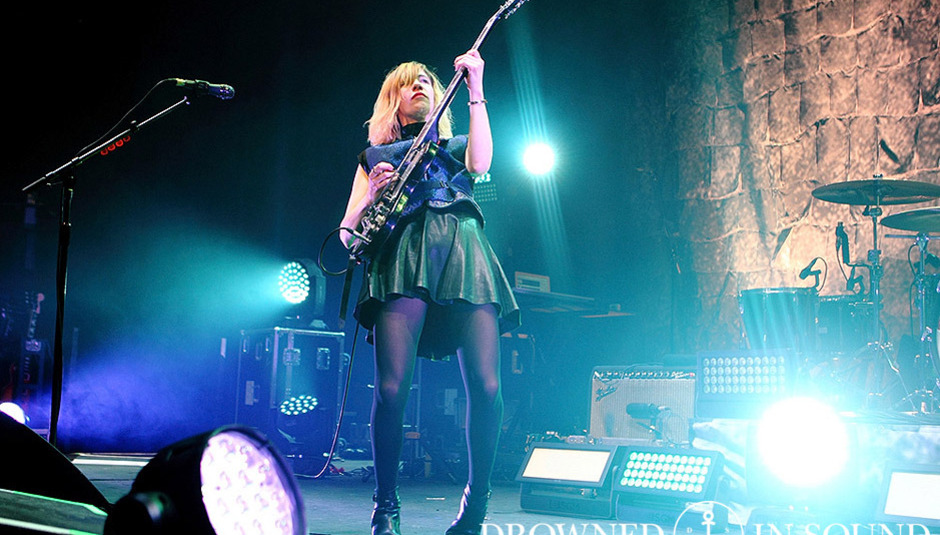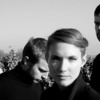“Damn you…DAMN YOU!” The two simple, snarled words laced with rage at the beginning of Sleater Kinney’s classic track ‘Little Mouth’ stand out as signifiers of a band that has never given two fucks about living up to anyone else’s expectations other than their own. So much so that 10 years ago after their most successful album to date, The Woods, they went on hiatus with little as much as an explanation.
It shouldn’t have been a surprise then when last October Sleater Kinney announced without warning that they were coming back and, unlike their cashing in contemporaries, they would be releasing not only a career spanning box set, Start Together, but a new album No Cities To Love. After years of savouring the morsels of the band member’s individual projects –Corin Tucker released a solo record, Janet Weiss toured with Stephen Malkmus and the Jicks and Quasi and Carrie Brownstein formed supergroup Wild Flag as well as creating a little known comedy series called Portlandia – this was like being served a sumptuous banquet.
No Cities To Love has had Sleater Kinney once again standing tall and screaming out against the accepted modes of society to ruptured riffs against a backdrop of ambivalence and musical vapidity: opener ‘Price Tag’ rails against the confines of capitalism, ‘Surface Envy’ is a defiant call against adversity and ‘New Wave’ celebrates people power. Recent live shows have had the band at their visceral best; at their Roundhouse show in London they played a galvanising career-spanning two hour set that ended with Carrie making a heartfelt rallying call to continue the fight for respect and equality.
Before the band’s triumphant Roundhouse show in London we snatched a chat with Carrie Brownstein down the line from her hotel room. In a 20 minute whirlwind we discovered why the band originally went on hiatus, what Carrie thinks the impact of Riot Grrrl is over 20 years on, if this will be their last album and why we should never, ever trust a lyric website….ever.
DiS: You were interviewed as a band by Broad City’s Abbi Jacobson and Ilana Glazer. What was the experience of a live Q&A like?
CB: It was really wonderful, I’m a huge fan of Broad City and I’ve met Abbi and Illana before: they’re very funny, smart and interesting women. I think we were very excited to engage in public discourse and a chance for the audience to have a birds-eye view into our conversation and hopefully make it interesting, I think we did. We really had a blast and it was great to take questions from the audience - it felt very special, it was very inspiring.
Recently you sat on the other side of a live Q&A when you interviewed Kim Gordon. What was that experience like? She seems to be a very private person.
Well, Kim is a dear friend of mine and I’m a big fan of her memoirs: it’s wonderfully written, it’s vulnerable, it’s beautiful and I was excited to talk to her. Yes, she can be more reticent as an interview subject but I think that I was aware of my role as an interviewer and tried to keep the conversation moving and have a lot of topics to talk about it. I found that one very enjoyable as well.
Sleater Kinney went on hiatus in 2006, what were your reasons at the time for going on hiatus?
I think that we just felt that we had reached a natural stopping point: we were very proud of the reception of The Woods, we had succeeded in defying the audiences and critics expectations of what we were as a band. We weren’t really sure what we were going to do after that and it had come to a point where some of us didn’t enjoy or appreciate touring as much.
It just felt like it was the thing we only wanted to do if we really enjoyed it - it’s not something you can do half-heartedly - so we stopped it while there was still something to cherish, still something to love about the band than it coming to a grinding halt.
Did you always know you’d get back together?
Yeah, I think there was a reason that we used the word ‘hiatus’. That we felt like it wasn’t necessarily the end of the story, yet we weren’t sure yet how it would continue.
Before you announced the release of No Cities To Love you were rehearsing and recording for two years. How hard was it to keep that a secret? I read an interview with Janet where she said you were the worst at blowing it.
Haha. I think we trusted that the people we were communicating with about it would honour the secret and I think people were also not sure what we were thinking of; I think some people just assumed, “oh, they’re going get back together and do some kind of reunion” when in actuality we were plotting a new record.
It was hard not to talk about it as there were so many logistics in terms of coordinating those things with other aspects of our lives. Y’know, the band is very special to us and I think it’s testimony or testament to how special it is to other people that they honour the secrecy of it.
The announcement back in October was so warmly received. How did that make you feel?
It was wildly flattering, wonderful and it was surprising as sometimes there’s such a gulf between enthusiasm and participation: to be enthusiastic about something doesn’t mean that you’ll actually buy tickets and go to a show. When people started buying tickets to the shows and they were selling out in a matter of minutes we felt very proud and relieved.
You started out playing live again with an ambitious 40 date tour in America. What was the tour like?
The tour of the US was really wonderful I think we planned it really well; we played some smaller cities and warmed back-up into playing together as I think, no matter how much you rehearse, you can’t really practice playing in front of the crowd.
It was good to have some shows in out of the way places and then we started to hit the bigger cities: the crowds were just effusive, very effervescent and very demonstrative and we felt very special to play for people again. It was a good mix in terms of demographic, young and old, some had just discovered us from the new record which was kind of our goal.
Corin has been quoted as saying your live show is now more “theatrical”. In what way is it theatrical?
I don’t really know if it’s more theatrical, I think there are certain types of elements in terms of lighting and backdrop: there’s a certain intentionality behind it that lends itself to some of the new songs, the kind of tension of the new songs, it does speak to a dark underbelly of the themes and they also play in really well with the old songs. It’s a heighten sense, you know? I don’t think that it’d make any sense or even matter, if the music or performance wasn’t very driven or very bold.
All of your previous albums have had clear themes that have explored relationships, equal rights, politics and more. What themes did you want to explore on this record?
I think when we began exploring the themes on the record (because we had 14 songs and we narrowed it down to about 10) we were really singing about power and people’s relationship to it, and the kind of emptiness you can find in wanting it or maintaining it the lengths people go to.
Also, the ways that power inequities keep a proportion of people alienated from a part of society, the part that is inaccessible: what to do when you’re living on the periphery of power? How to find your own sense of strength? What it means to live and not just to struggle?
There are two versions of being in the world: there are people who are living and there are people who are struggling. I think that’s what this record is about from personal and political perspective.
You wrote the songs for this album in Corin’s basement. How has the way you work together evolved over the past two decades?
In some ways that was actually a very primary way of working together, that’s how we wrote Call The Doctor and Dig Me Out. In some ways we returned to the original mode of working together, which was just her and I sharing songs and ideas and later bringing them to Janet.
Corin and I, I mean all three of us, but Corin and I definitely have a natural chemistry that’s very hard to suppress - it feels very almost like a psychic connection sometimes.
You brought in John Goodmanson, who produced four of your other records, to produce this album. Why did you choose to work with him again?
We knew with John that he was not going to be precious about this band. We didn’t want someone that was so excited about making our first record in 10 years that they’d think, “I just want to capture the quintessential version of the band and just get you guys in a room.”
He doesn’t care about that as he’s seen so many permutations of this band, he’s recorded so many iterations our songs that he would not be looking at the band through any kind of sentimental lens. He just wanted to really apply some production techniques and really approach it in a new way, rather than recapture what we did before and that was very important to us.
‘Price Tag’ is about the human cost of capitalism and in the Broad City interview Janet stated very strongly that as a band you don’t allow your songs to be synced or sold for adverts. Personally, how do you feel about being an artist and getting involved in commercial partnerships? . I did see that you acted in an Amex commercial.
I think these are very tricky times, I feel more comfortable using myself in something than I would my own music. At the same time I don’t really fault people for trying to survive in a culture that across the board devalues art; the artist and crafts people. It kind of makes sense in a way that you have to learn and figure out different ways of working the system. Sleater Kinney, as an entity, we collectively have one set of ideas of how we’re going to be as a band and individually we all make our own choices.
Bob’s Burgers, the animated TV show, created the video for ‘A New Wave’, which is great and really conveys the energy of the song. How did that collaboration come about?
It was one of those things where our people reached out to them and, like the Broad City thing, they’re mutual fans. It was really exciting to put the whole interpretation of the video into someone else’s hands and it was kind of the perfect visual accompaniment to that song, I really like it a lot.
‘A New Wave’ has the strange line, “I wanna, gotta go the way my butt beats”. What does that mean?
“Butt beats?!” It was “blood beats”. It’s a reference to a James Baldwin quote.
When you announced you were coming back last year you also released a career-spanning box set Start Together, which had been curated by Corin. What’s your favourite Sleater Kinney album?
I think the biggest surprise for me was how much I loved All Hands On The Bad One, I really thought that there was this real link between some of our other albums: I could hear some of the bluesy guitar on a song like ‘Male Models’ that ended up being on ‘Light Rail Coyote’ and the pop element, bigger choruses like ‘All Hands On The Bad One’ or ‘Leave You Behind’, like the new album it’s very melody centric.
I’m reading Girls To The Front by Sara Marcus, which explores the impact of Riot Grrrl as a feminist movement. At the time you were in Riot Grrrl band Excuse 17, what do you think about the impact of the movement 20 years on?
I think it’s taken on different forms, when I see young women and young men trying to form collective ideas or cohering around a certain blog or a group of artists or writers I see that very unapologetic, bold, iconoclast effort; whether it’s Rookie Mag or in the writing of Roxane Gay, you just really feel this kind of push to rally people around ideas that work to further empower people.
I think the sophistication level is higher in that it’s less based on just women and realising, in order for any of it to work, we can’t ignore the oppression or inequality of one group and it all has to be collective. I think it’s taken on a more sophisticated purview, but I see that same excitement about joining with other people and doing something that was very bold.
When Sleater Kinney first started in the mid 90s there were a lot of features and covers in music journalism specifically dedicated to ‘women in music’. Now you’re in phase two of the band, do you feel women in music in the media have stopped being treated as an ‘other’?
I think there’s definitely been lots of steps forward and attempts at that. I think there’s definitely less of even just kind of a binary, a binary thought process, of differentiating things by gender. Some things are still very unequal, but there’s a little bit more sophistication too.
You’re releasing your memoirs Hunger Makes Me A Modern Girl in October. What did you love and hate about the writing process?
I loved finishing it! It’s hard to say, only in retrospect do I feel a certain fondness for it. There were certain days where I was like, “I’m really making some progress”. The actual rigour of it doesn’t have a lot of daily rewards, but I’m happy with how it turned out.
Whilst you were on hiatus you created Portlandia, wrote a blog for NPR and contributed to The Believer and Slate. There’s a lot of musicians who now have a secondary career outside of music. Why is it important for you to be creative outside of music?
I’ve always been a person who’s pursued things outside of music, so it seems very normal to me. It’s kind of a nice way of matching the quickness and hectic way my brain thinks – I have to wrap it around multiple tasks.
On the last track on the record, ‘Fade’, Corin sings: “If we are truly dancing our swansong.” Is this a hint that this might be it?
I don’t know, you’d have to ask Corin. I don’t think so, I think she’s kind of singing from a character.
Now you’ve come back with Sleater Kinney would you ever consider reforming Wild Flag or Excuse 17?
No, no. Sleater Kinney is the one whose story was still ongoing and we still wanted to continue telling it.
No Cities To Love is out now on Sub Pop.
Lead image by Burak Cingi. Full gallery here.






















